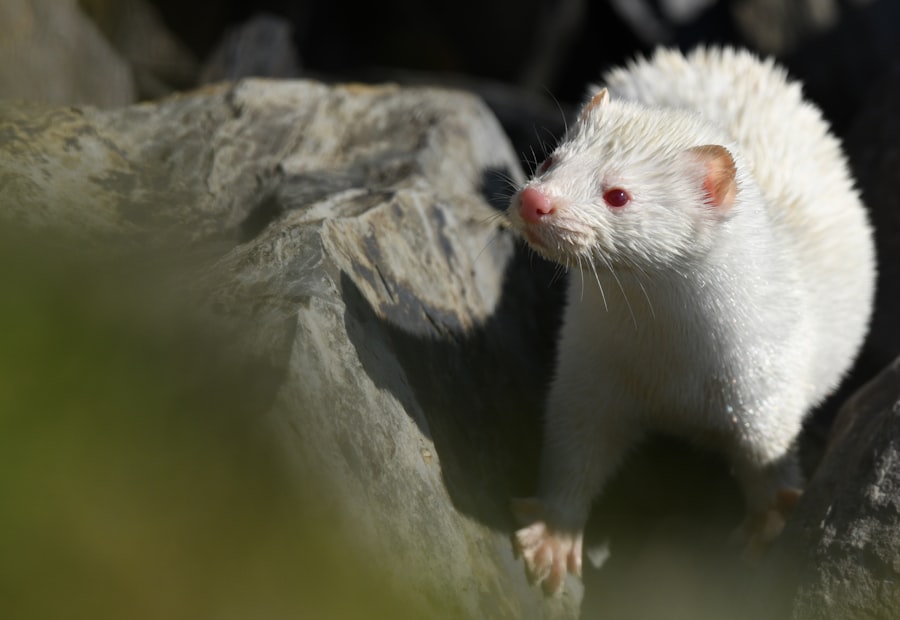Minks are small carnivorous mammals renowned for their exceptional hunting abilities. These agile predators can climb, swim, and dig with ease, making them a significant threat to chickens. Primarily nocturnal, minks are most active during nighttime hours.
They are opportunistic hunters, readily exploiting any chance to capture prey. Minks are territorial animals that use scent glands to mark their territory, deterring other minks from entering. Understanding mink behavior is essential for protecting chickens from these predators.
Their habits and tendencies inform effective strategies for safeguarding poultry. Minks can access chicken coops by climbing, digging, or squeezing through small openings. They are persistent hunters, often returning to a targeted coop until successful in catching a chicken.
As excellent swimmers, minks pose an increased threat to properties near water sources such as ponds or streams. By comprehending mink behavior, chicken owners can implement proactive measures to secure coops and prevent these predators from accessing their flocks. This knowledge is crucial for developing effective protection strategies and maintaining the safety of domestic chickens.
Table of Contents
Key Takeaways
- Mink are agile and intelligent predators, known for their ability to climb and swim, making it important to understand their behavior in order to effectively protect chickens.
- Securing the chicken coop with sturdy fencing and predator-proof locks is essential to prevent mink from gaining access to the chickens.
- Implementing predator deterrents such as motion-activated lights, sound devices, and predator urine can help to deter mink from approaching the chicken coop.
- Utilizing motion-activated devices such as sprinklers or noise makers can startle mink and discourage them from preying on chickens.
- Creating a safe outdoor space for chickens by using covered runs and secure fencing can provide additional protection from mink and other predators.
- Regularly inspecting the perimeter of the chicken coop for signs of mink activity, such as tracks or droppings, can help to identify potential vulnerabilities and prevent attacks.
- Seeking professional assistance from wildlife experts or pest control professionals can provide valuable insight and assistance in effectively protecting chickens from mink predation.
Securing the Chicken Coop
Inspecting the Coop Structure
Start by checking for any gaps or holes in the walls, roof, or floor of the coop. Minks can squeeze through very small openings, so it is important to seal any gaps with sturdy materials such as hardware cloth or wire mesh. Additionally, make sure that all doors and windows are securely latched and cannot be easily pried open by a determined mink.
Protecting the Perimeter
It is also important to bury wire mesh around the perimeter of the coop to prevent minks from digging underneath and gaining access from below. This will ensure that the coop is secure from all angles.
Securing the Fencing
Another important aspect of securing the chicken coop is to ensure that the fencing around the coop is sturdy and predator-proof. Minks are agile climbers and can easily scale traditional chicken wire fencing. To prevent this, consider using hardware cloth or welded wire fencing with smaller openings that minks cannot squeeze through. Additionally, consider adding an overhang or electric wire at the top of the fence to deter minks from climbing over. By securing the chicken coop with these measures, you can greatly reduce the risk of mink attacks on your flock.
Implementing Predator Deterrents

Implementing predator deterrents around your property can help discourage minks from targeting your chicken coop. One effective deterrent is the use of predator urine or scent repellents. Minks are territorial animals, and they will avoid areas that are marked by the scent of potential predators such as foxes or coyotes.
By strategically placing predator urine or scent repellents around the perimeter of your property, you can create a barrier that deters minks from approaching your chicken coop. Another effective predator deterrent is the use of motion-activated lights or sound devices. Minks are nocturnal animals, and they prefer to hunt under the cover of darkness.
By installing motion-activated lights around the chicken coop, you can startle and deter minks from approaching the area. Similarly, sound devices that emit loud noises or predator calls can also be effective in scaring off minks. These deterrents can be particularly useful in combination with other security measures to create a multi-layered defense against mink attacks.
Utilizing Motion-Activated Devices
Motion-activated devices can be a valuable tool in deterring minks and other predators from targeting your chicken coop. Motion-activated lights are an effective way to startle and deter minks from approaching the coop during the night. These lights can be strategically placed around the perimeter of the coop and set to turn on when motion is detected.
The sudden burst of light can startle minks and discourage them from attempting to access the coop. In addition to motion-activated lights, sound devices that emit loud noises or predator calls can also be effective in deterring minks. These devices can be set to activate when motion is detected, creating a startling noise that can scare off potential predators.
By utilizing motion-activated devices in combination with other security measures, you can create a strong defense against mink attacks on your flock.
Creating a Safe Outdoor Space for Chickens
Creating a safe outdoor space for your chickens is essential in protecting them from mink attacks. Consider using a secure chicken run or enclosure that is surrounded by sturdy fencing and a secure roof. This will provide your chickens with a protected outdoor space where they can safely roam and forage without the risk of being targeted by minks.
Make sure that the fencing is buried underground to prevent minks from digging underneath and gaining access to the enclosure. In addition to a secure outdoor enclosure, consider adding natural deterrents such as dense shrubbery or thorny plants around the perimeter of the chicken run. Minks prefer to hunt in areas with easy access and will avoid dense vegetation that could hinder their movements.
By creating a safe outdoor space for your chickens with these measures, you can greatly reduce the risk of mink attacks on your flock.
Regularly Inspecting the Perimeter

Conducting a Thorough Inspection
Walk around the perimeter of the coop and look for any signs of digging, burrowing, or attempts to access the area. Check for any gaps or holes in the fencing or walls that could provide entry points for minks.
Addressing Vulnerabilities Immediately
It is important to address any issues immediately to prevent minks from gaining access to your flock. In addition to inspecting the perimeter, consider installing security cameras around the property to monitor for any signs of mink activity.
Staying Vigilant Against Mink Attacks
By regularly inspecting the perimeter and utilizing security cameras, you can stay vigilant against potential mink attacks and ensure the safety of your flock.
Seeking Professional Assistance
If you are facing persistent mink attacks on your chicken coop despite implementing various deterrents and security measures, it may be necessary to seek professional assistance. Contacting a wildlife control professional or local animal control agency can provide you with expert guidance and assistance in dealing with mink infestations. These professionals have the knowledge and experience to effectively address mink problems and implement strategies to protect your chickens.
A wildlife control professional can conduct a thorough assessment of your property and chicken coop to identify any weaknesses that may be attracting minks. They can then recommend and implement targeted solutions to secure the area and deter minks from targeting your flock. Additionally, they may be able to provide ongoing monitoring and maintenance to ensure that your property remains protected from mink attacks.
In conclusion, understanding mink behavior and implementing effective security measures are crucial in protecting your chickens from these formidable predators. By securing the chicken coop, implementing predator deterrents, utilizing motion-activated devices, creating a safe outdoor space for chickens, regularly inspecting the perimeter, and seeking professional assistance when necessary, you can greatly reduce the risk of mink attacks on your flock and ensure their safety and well-being.
If you’re looking for ways to keep mink away from your chickens, you may also be interested in learning about what vegetables quails eat. Check out this article on Poultry Wizard to discover the best vegetables to feed your quails for optimal health and nutrition. Understanding the dietary needs of your quails can also help in creating a more secure and healthy environment for your chickens.
FAQs
What are minks and why are they a threat to chickens?
Minks are small, carnivorous mammals that are known to prey on chickens and other small animals. They are a threat to chickens because they can easily sneak into coops and kill or injure the birds.
What are some signs that minks are targeting my chickens?
Signs that minks are targeting your chickens include missing or injured birds, as well as evidence of mink tracks or droppings near the coop.
How can I keep minks away from my chickens?
To keep minks away from your chickens, you can use hardware cloth to secure the coop, install motion-activated lights or sound devices, and keep the area around the coop free of debris and hiding spots for minks.
Are there any natural deterrents for minks?
Some natural deterrents for minks include using strong-smelling substances like predator urine or ammonia around the coop, as well as planting thorny bushes or using other natural barriers to make it difficult for minks to access the chickens.
What should I do if I suspect minks are targeting my chickens?
If you suspect minks are targeting your chickens, it’s important to take immediate action to secure the coop and protect the birds. You can also contact local wildlife authorities for assistance in dealing with the mink threat.
Meet Walter, the feathered-friend fanatic of Florida! Nestled in the sunshine state, Walter struts through life with his feathered companions, clucking his way to happiness. With a coop that’s fancier than a five-star hotel, he’s the Don Juan of the chicken world. When he’s not teaching his hens to do the cha-cha, you’ll find him in a heated debate with his prized rooster, Sir Clucks-a-Lot. Walter’s poultry passion is no yolk; he’s the sunny-side-up guy you never knew you needed in your flock of friends!







